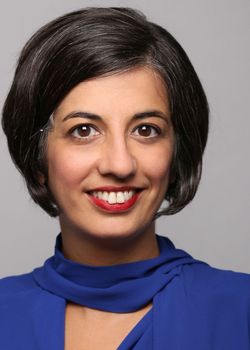Dr. Hürcan Aslı Aksoy
Turkey/CATS Senior Fellow
Areas of Expertise
- Turkey
- Crisis management
- EU foreign policy
- European Union
- Human rights
- Political systems
Turkish foreign policy in the region, Turkey in the Middle East and North Africa, Domestic politics, Gender politics, Civil Society
Working GroupsShort Curriculum vitae
Since January 2026 Senior Fellow at the Centre for Applied Turkey Studies (CATS) at SWP, Berlin
Since 2024 researcher in thematic working group Autocratization as a challenge for German and European politics
06/2023 - 12/2025 Head of the Centre for Applied Turkey Studies (CATS) at SWP, Berlin
09/2019 - 06/2023 Deputy Head of the Centre for Applied Turkey Studies (CATS) at SWP, Berlin
2016 - 2019 Research Associate at the Chair of Middle East Politics and Society at the University of Erlangen-Nürnberg
01/2015 - 03/2015 Junior Visiting Fellow at Institute for Human Sciences (IWM) in Vienna, Austria
2009 - 2014 PhD and adjunct lecturer at the Institute of Political Science at the Eberhard-Karls University of Tübingen
2003 - 2008 M.A in Political Science and Philosophy at the Eberhard-Karls Universität Tübingen
SWP Publications
-
Türkei–Israel: Riskante Eskalation in einer fragmentierten Regionalordnung
SWP-Aktuell 2026/A 07, 11.02.2026, 7 Pagesdoi:10.18449/2026A07
-
Alignment of Necessity
Turkey’s Role in the Future European Security Architecture
SWP Comment 2025/C 36, 07.08.2025, 8 Pagesdoi:10.18449/2025C36
-
Partner oder Rivale: Die Türkei als verlässlicher neuer Verbündeter für Europas Sicherheit?
Die EU-Beitrittsverhandlungen mit der Türkei liegen auf Eis, aber wirtschafts- und vor allem sicherheitspolitisch wird Ankara immer wichtiger für Europa. Hürcan Aslı Aksoy, Sinem Adar und Günter Seufert erklären, wie die Türkei künftig in das europäische Sicherheitskonzept eingebettet werden sollte.
SWP-Podcast 2025/P 20, 31.07.2025 -
Turkey’s Authoritarian Turn: İmamoğlu’s Arrest and Europe’s Strategic Dilemma
Erdoğan expects that Turkey’s rising importance in the security realm will force Europe to ignore his crackdown on the opposition. But without basic democratic foundations, Turkey cannot be a credible security partner, say Hürcan Aslı Aksoy and Salim Çevik.
Point of View, 25.03.2025 -
Turkey’s Authoritarian Drift Accelerates: Istanbul Mayor Faces Imprisonment
Erdoğan’s government is tightening its grip on power, using the judiciary to sideline key opposition figures like Istanbul Mayor Ekrem İmamoğlu. This represents another step toward full authoritarian rule, say Hürcan Aslı Aksoy and Salim Çevik.
Point of View, 26.02.2025 -
Türkei: Vorsichtig, aber optimistisch
Die Türkei scheint weniger besorgt über eine zweite Präsidentschaft von Donald Trump zu sein als viele andere Länder in Europa.
in: Perspektiven auf Trump II aus Europa, Nahost und AfrikaBeitrag zu einer Sammelstudie, 20.01.2025
External publications
-
Das sind die Gründe für die gefallene Geburtenrate
Interview von Andre Zantow, in: Deutschlandfunk Kultur, 02.12.2025 (Audio) -
Autoritäre Dämmerung
in: Journal für Internationale Politik und Gesellschaft (IPG), Europa, 16.09.2025 -
Kurdish PKK fighters lay down their arms after decades-long insurgency
in: DW News, 11.07.2025 -
Die Zukunft der NATO
Strategische Ambivalenz: Die komplexe Rolle der Türkei in der Entwicklung der NATO
in: Die Zukunft der NATO, Friedrich Ebert Stiftung (Hrsg.), Juni 2025 -
How Germany’s incoming government will work with Turkey
in: Atlantic Council, TURKEYSource, 25.03.2025 -
Türkei: Wer kann Erdoğan noch stoppen?
Interview von Rahel Klein, in: Deutschlandfunk Nova, Unboxing News, 21.03.2025
